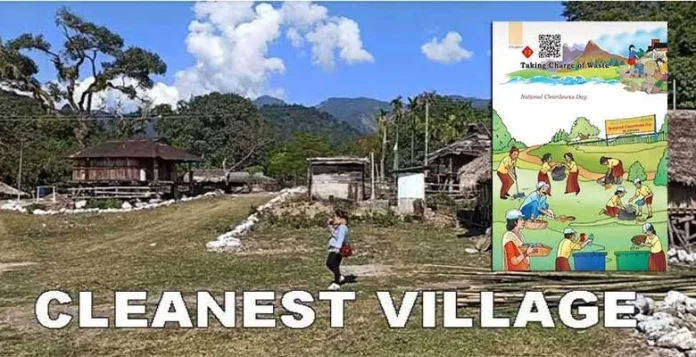ITANAGAR, June 24: In a proud moment for Arunachal Pradesh, Siluk—a picturesque village in the Mebo subdivision of East Siang district—has been featured in the Class III Environmental Studies (EVS) textbook published by NCERT, recognising its pioneering efforts in waste management and community-driven environmental stewardship.
The chapter, titled “Taking Charge of Waste”, profiles Siluk as a zero-waste village, describing its spotless lanes and lush green surroundings as being akin to “walking in a garden.” The lesson introduces young learners across India to Siluk’s transformative journey, showcasing how the village embraced composting, recycling, and transparent dustbin usage to build a cleaner, healthier community.
Siluk’s innovative practices have garnered national attention. The village uses two-colour bins for waste segregation, has set up soak pits, and utilizes bamboo dustbins in partnership with organisations like the Green Squad for regular waste collection. These environmentally conscious initiatives have not only made Siluk a role model in Arunachal Pradesh but now serve as an inspiration for students nationwide.
Chief Minister Pema Khandu, who visited the village in December 2024, lauded its inclusion in the NCERT curriculum. “Siluk’s story inspires young minds across India to embrace sustainability,” he said. Local MLA Oken Tayeng echoed the sentiment, calling it a “moment of pride for Arunachal Pradesh,” and credited the villagers’ unity and long-term commitment to cleanliness.
The textbook inclusion emphasizes how simple, everyday actions like composting and recycling can have a profound impact on public health and the environment. It also encourages students to observe and adopt clean habits in their own surroundings.
Siluk’s transformation began in earnest in February 2021, when the village leadership—including gaon burahs, gram panchayat members, and the Swachh Siluk Abhiyan—signed a “zero-waste” pledge with the support of East Siang district officials. This led to the introduction of compost pits, eco-friendly waste bags, regular trash collection systems, and more.
Later that year, Siluk was declared the cleanest village in East Siang for the second consecutive time. The recognition was based on achievements such as sanitary toilets, effective drainage systems, and compliance with waste segregation protocols.
What sets Siluk apart is the high level of community participation in its zero-waste journey. Residents have continued practices such as bamboo dustbin use, eco-brick making, wildlife rescue, plastic recycling, cattle confinement, and regular cleanliness drives—all carried out without substantial external funding.
The story of Siluk now serves as a learning model in classrooms across India, offering young students insight into how local, grassroots action can lead to national recognition and lasting environmental change. The textbook presents Siluk as proof that children, families, and communities alike can contribute to a cleaner, more sustainable future through collective responsibility and eco-conscious behaviour.

